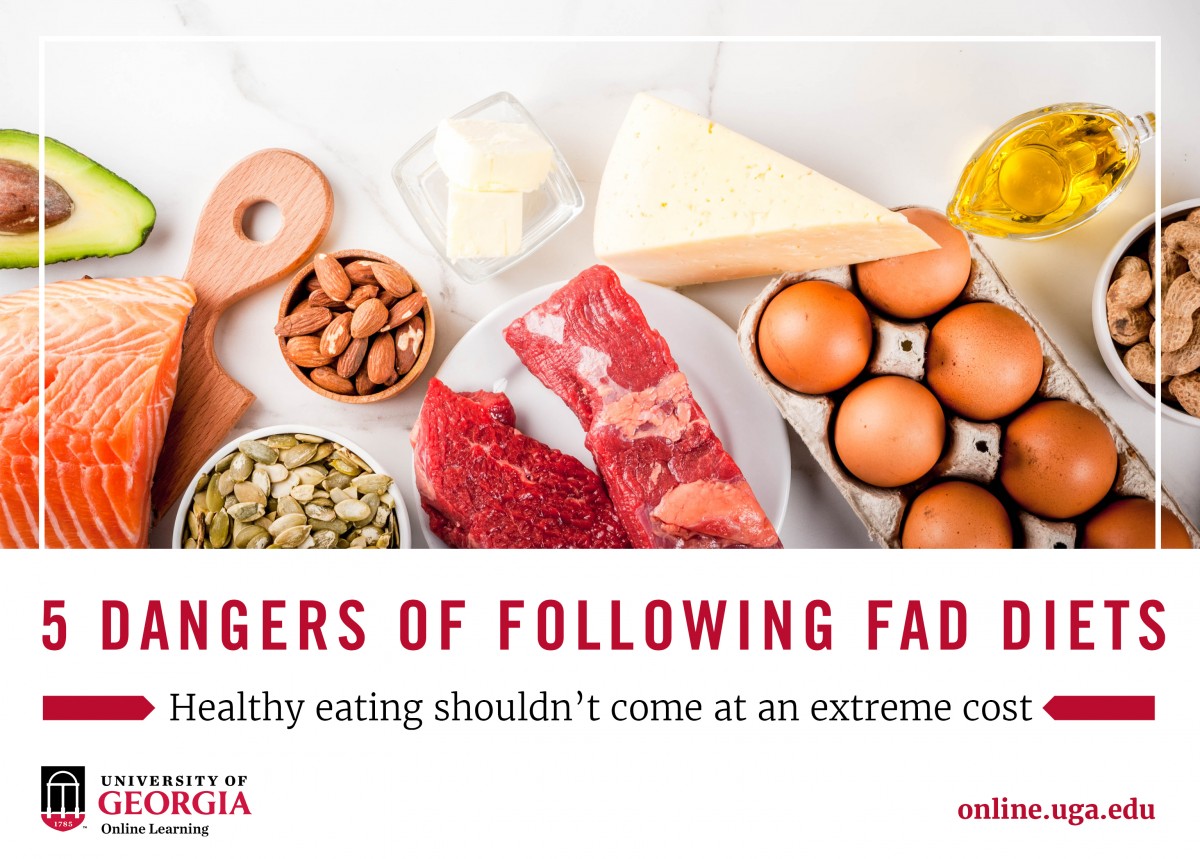5 Dangers of Following Fad Diets
5 Dangers of Following Fad Diets
With so much information readily available and new fad diets popping up what seems like every other week, it is hard to know what to believe. New fad diets endorsed by celebrities and filling your social media feeds makes them hard to ignore. However, many of these diets are not backed by research and may be causing your body more harm than good. From the ketogenic diet to eating gluten or dairy-free, there may be dangers associated with fad diets. Emma Laing, UGA online professor and director of dietetics provides her insight in a recent Vitacost article.

Healthy eating may look different for you versus your peers, but there are some important things to look out for when it comes to extreme dieting. Here are five reasons that following a fad diet can be risky.
1. They’re too restrictive
Following a fad diet comes with extreme limitations and often elimination of entire food groups. “When we restrict carbs and/or fat, the body releases specific hormones to counter the restriction, promoting increased cravings of said macronutrients,” says Rachel Fine, RD, of To The Pointe Nutrition. This is because your body relies on both carbs and fat for very specific metabolic functions, and when you’re not consuming one or both of these macros, it will fight until you can no longer resist, she adds.
Diet restrictions may later result in binge eating, and restriction is also associated with lethargy and fatigue. This means less energy for exercise and going on with your daily life.
2. You could be missing out on essential nutrients
Some diets may encourage you to cut out food groups like whole grains that your body uses for fuel and nutrients, and others even encourage elimination of certain fruits and vegetables that provide your body with essential nutrients and antioxidants.
“If this diet instructs you to remove foods from your diet that are high in fiber and essential nutrients, you might lose weight, but you could end up with other complications, such as nutrient deficiencies and changes in your digestive, muscle, and bone health,” says Emma Laing.
3. They can be expensive
Your body isn’t the only thing that will be affected by some of these extreme diets; your wallet will be hurting as well. If you are following a diet that requires buying only premium and organic ingredients or certain supplements, you grocery bills are going to be steep. Many of the nutrients from supplements can be found solely in food and by eating healthily, so these aren’t always necessary.
4. They’re not sustainable
Because of the extreme steps you often have to take to follow a fad diet, they often don’t last, and you end up gaining back all of the weight that you just lost. In most cases, fad diets are not successful long-term especially for your mental and physical health. A sustainable diet where you allow yourself wiggle room and the occasional dessert are often the most successful.
“If you find that your ability to enjoy travel or social activities involving food is suffering, chances are, this diet will not be sustainable,” says Laing.
5. They could actually cause weight gain
Your metabolism is one of the biggest things affected by manipulating your diet. Weight gain is a common side effect of fad diets, and initial weight loss from following a fad diet is typically just a loss of water weight. The nature of extreme diets can ultimately cause your metabolism to slow because it is in survival mode hanging on to extra fat for fuel.
Learn more about UGA’s online M.S. in Foods and Nutrition, Community Nutrition and read the source article on Vitacost.
